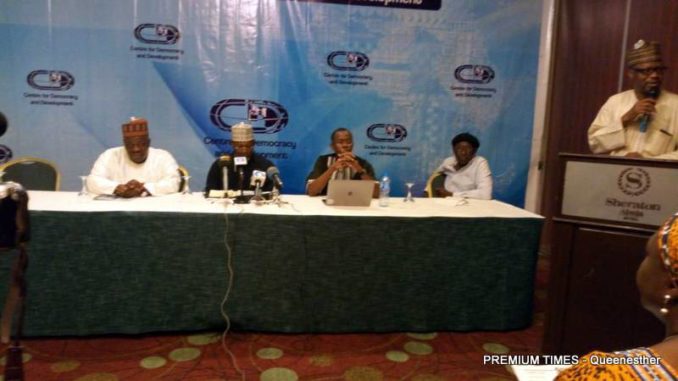
A former Chairman of Nigeria’s Independent National Electoral Commission, Attahiru Jega, has lamented that democracy has failed to deliver freedom to Africans.
He also says African leaders have failed to understand that regular, free and fair elections are a key component of democracy.
Mr. Jega, who conducted the 2011 and 2015 general elections in Nigeria, made this statement on Friday in Abuja at an interactive forum organised by the Centre for Democracy and Development, CDD, under the theme: “Three decades of democratic transition in Africa.”
The forum discussed how African governments can reconcile procedural/formal democratic practices with substantive democracy; and how democratic institutions can deliver public goods in African countries.
“In Africa today, we notice that despite achieving democracy, we’ve not had complete freedom,” Mr. Jega said.
“We still experience struggles and challenges and difficulties. The struggle for democracy has been characterised by frustrations.
“African democracy contains serious challenges as to whether it is delivering dividends to its people. We can’t categorically say we’re enjoying democracy because we still experience instability and crises.
“One of the key components of democracy that every African should note is regularity in elections as well as integrity of elections.
“Now, having said that, it is also important to recognise that democracy really is in a state of flux in the African continent and how, also, governance that is a product of this democratic transition is failing to satisfy the fundamental needs and aspirations of the people.
“The question that has been put arising from this, explicitly stated in the concept note is whether democracy is appropriate for the African country, which means that there is ongoing frustration that democracy is not delivering what is expected of it; whether in terms of legitimacy of regime, stability and peaceful coexistence under a multi-ethnic and diverse context or meets the needs of people in terms of the quality of government.
“Clearly, there is a contradiction in that. For example, one of the key tenets of democracy is regularity of elections and in most African countries now, elections have become routinised. But what is the quality of those elections in terms of bring people who are representatives and who deliver of the aspirations of the people?
“For me, I think the key thing is the integrity of elections”, Mr. Jega said.
A guest speaker from Sierra Leone, Ibrahim Abdullah, lamented Africa’s poor development despite achieving democracy.
“Democracy needs to be problematised. After 50 years of independence in Africa, it’s a shame that the voices of the masses are still not being heard; they are ever present but never invited to the table.
“Institutions designed to deliver their aims are doing everything but delivering their aims. Democracy is about good governance and good governance is about service delivery’, he said.
The Director of CDD, Idayat Hassan, explained that the event was held to look at how democracy is evolving on the continent.
“There are countries that are actually striving to be thorough democracy and in the same vein there are countries who are operating hybrid system. They are democratic when it suits them and when it doesn’t suit them they become authoritarian.
“You see what is happening in Kenya at the moment; and many of the countries in the continent are actually like that. And of course, the ones that are deliberative are authoritarian in nature, using elections to actually legitimise themselves.
“It is actually urgent and imperative we have a rethink. I mean we are talking about 30 years plus, almost 31 years since the wave of democratic and multiparty democracy swept into Africa. How can it impact the people beyond elections? It is also important.
“Is it that it has actually improved the poverty level? Is it that inclusion of women, young people and persons with disabilities has improved within this period?
“So there are very big issues beyond the issues of economic growth that we must deal with. There is also a need for us to rethink the whole system of democracy,” she said.
Ms. Hassan frowned at the decision of the National Assembly to adjust the order of election in Nigeria, stressing that it would affect INEC’s plan.
“I think that would not actually help the planning of INEC who have already released a timetable. Then at times, we should not also upset the system. If you would also recollect, in the 2010 amendment, there was an attempt to do this but at the court, it was quashed.
“Revisiting it is a distraction and it is something that is not welcomed for a process that we have been planning for, more than 400 days into the election”, she said.
Responding to a question about situating democracy in Nigeria, she said, “I think we are practising a hybrid system. We practise democracy but when it becomes necessary, we become authoritarian because when you look at the level of press freedom in Nigeria in the past two years, it has not been commendable.
“When you also look at social media monitoring request from Google, Facebook on accounts of citizens, you find that Nigeria, South Africa and Egypt topped the list. In fact, it is a fact to say that we are a hybrid system.”
END

Be the first to comment